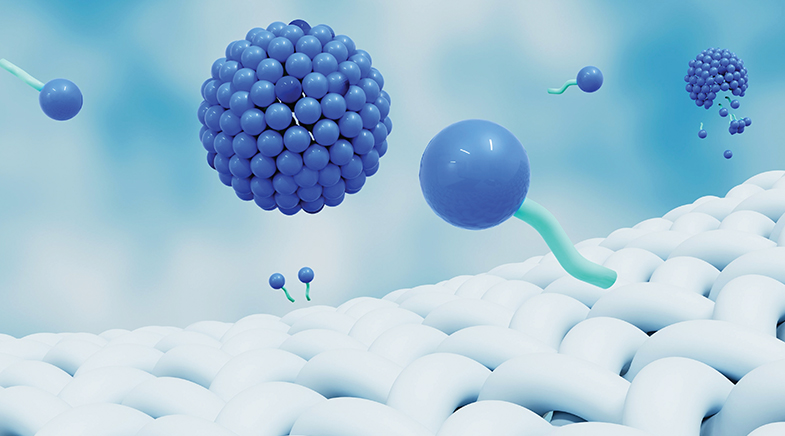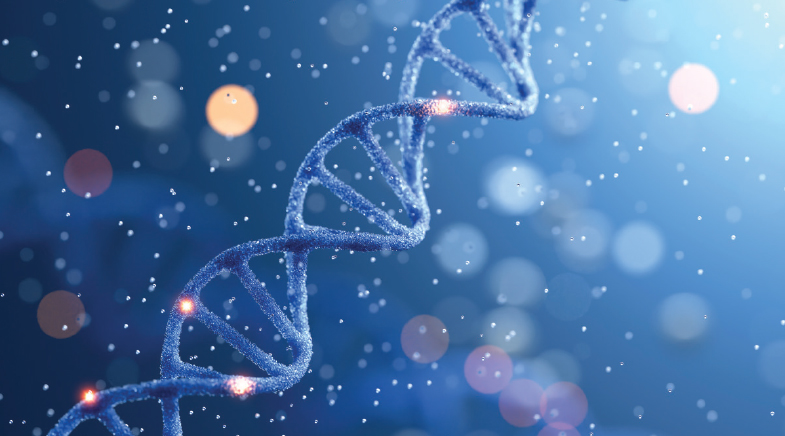'The brain knows what kind of sleep it needs'
-
- from Shaastra :: vol 02 issue 04 :: Jul - Aug 2023

Bruno van Swinderen on the regulatory characteristic of sleep.
The poet Edward Young lyrically defined sleep as "tired nature's sweet restorer". Evolutionary and population biologist Bruno van Swinderen's research, in his lab at the Queensland Brain Institute, may be couched in somewhat more prosaic language, but his team has made important contributions to understanding the restorative nature of sleep. Van Swinderen's team was the first to record electrical signals during sleep in the Drosophila fly, by inserting electrodes into the pinhead-sized brain of the insects. His pioneering work also led to the discovery of active or 'paradoxical' (wake-like) sleep in flies, similar to REM (rapid eye movement) sleep in humans. Through the study of sleep in the fly brain, he hopes to better understand the human brain's need for sleep. Excerpts from an interview:
You've studied the link between sleep and attention. What's the correlation between them?
When you pay attention to something, you're deliberately ignoring something else – or shutting off your perception of the things you're not paying attention to. If there's a mechanism in the brain to prioritise information – basically the perception of some things – it's not a stretch to think that the same mechanism might shut off perception as well. There's a way for the brain to shut off consciousness: some dynamic switch that allows attention to move from one thing to another. And I think that during sleep, it stops moving and shuts off. Why would those be different mechanisms? That seems to me to be something that evolutionarily would have been solved in one way. There was then an evolutionary benefit to shutting off attention for extended periods – at least attention to the outside world to allow some homeostatic mechanism to self-regulate for those times when attention is shut off.
Have these hypotheses been proven?
We know that parts of some circuits in the fly brain that control the capacity to pay attention also seem to be involved in regulating what we call active sleep. The very same neurons that, if you activate them, put the fly into a seemingly sleep-like state... also seem to be involved in regulating responsiveness to the outside world in the wakeful life.
"I'll be interested to see if at some point AI needs sleep: that will be worrisome – because it's then becoming a bit too 'human'."
What is the significance of your study with neuroscientist Paul Shaw (bit.ly/sleep-flies), which showed that sleep deprivation can kill flies?
We were post-docs in San Diego, and he'd been working with rats. There had been a famous experiment done with sleep-deprived rats (bit.ly/sleep-rats). He wanted to convincingly show by experiment that for a fly, sleep is perhaps similar to that for a mammal. We manually sought to sleep-deprive them over several days and nights.
To show that for a fly, sleep is similar to other animals, including mammals, you have to show many different things – for instance, that there are increased arousal thresholds. It's not just quiescence. The increased arousal thresholds are homeostatically regulated, and the drugs that affect sleep in mammals also affect sleep in flies in the same way. And it has similar functions. There are electrophysiological correlates. Once you show all of these, it becomes a bit more convincing.
Did the discovery (by your team and others) of sleep in flies and invertebrates give better tools to understand human sleep?
It did, but the problem is that the way that sleep has been studied in flies is by considering it as if it's just one thing. But we know from humans that REM sleep and deep sleep are completely different. During deep sleep, breathing is regular. During REM sleep, it's irregular, and so is the heartbeat. There are rapid eye movements, the temperature goes down. These are very different physiological states.
It's been shown in mammals that one function of deep sleep is to clear waste – misfolded proteins, for instance – from the brain. That's now been shown in flies, too. Except in flies, it's more a stage of sleep that we call quiet sleep rather than deep sleep. The functions have been evolutionarily conserved.
Does that mean the kind of sleep that almost all animals have been experiencing has been around for millions of years?
We need to be careful about generalising because it depends on what kind of sleep. The kind of sleep that I call quiet sleep has probably been. One hypothesis is that quiet sleep is the original kind of sleep that is linked to developmental processes and stress regulation. And that all animals have a bit of this because they all develop and they all need to deal with cellular stress. And that's maybe an older kind of sleep whose functions have been repackaged in what we call deep sleep in humans. One hypothesis we put forward relates to the functions of REM sleep, which is... more of an evolutionary novelty with animals that have complex brains and need to make predictions.
You say that the brain knows what kind of sleep it needs.
That's right. Sleep is a homeostatic process. That means that if the brain feels like something is missing, it refills it. How does the brain know? For instance, in the case of people who have experienced some brain damage because of, say, a stroke, they often get a lot of deep sleep. That's because deep sleep is associated with repair.
Likewise, when you encounter new situations, your brain has to somehow make new models of the world... through REM sleep. The brain knows that a growing child, for example, needs a lot of REM sleep because it hasn't experienced the world yet. To learn, the child needs to make all the new models of the world that it encounters for the first time.
These are all situations where the brain knows what kind of sleep it needs to be adaptive.
Elderly people tend to sleep less. But that's nothing to be concerned about, right?
One should not be alarmed in general unless there is a disorder. The brain knows how much sleep it needs. And sleep ontogeny across many animals shows that young animals often sleep more than older ones.
How do you account for the wide variation in sleep duration among different animal species? In general, carnivores sleep much more than herbivores.
I would hesitate to come to any strong conclusions about the amount of sleep every animal needs. Sometimes it's quite surprising. Why does a bat need to sleep 18 hours: because it's flying? Why does a cow or a horse only need to sleep two or three hours? It doesn't seem to be correlated to intelligence. A fly needs to sleep about 12 hours. That seems like an extraordinary amount of sleep time given that it's not doing anything extremely sophisticated in our perception.

It's probably a combination of different things. Some people, including (brain researcher) Jerome Siegel from UCLA, have argued that there is a component of sleep that is just about making sure that the animal is sequestered and safe. For many animals, sleep has a kind of ecological niche component. But some animals probably need a lot of sleep of a particular kind because it's important for their adaptability. Maybe carnivores are making more models of the world in terms of how they chase other animals.
"It's been shown in mammals that one function of deep sleep is to clear 'waste' from the brain. That's now been shown in flies, too."
There's diversity within species, too. You don't have to look further than within one species: humans. Infants spend 50% or more of their time asleep, and most of that is REM sleep. At age 70, much less of your sleep is REM sleep. You're trying to get as much deep sleep as possible because you have a brain that's falling apart and is susceptible to Alzheimer's. The brain then knows the kind of sleep it needs to fix itself, and is not too worried about trying to make new models of the world.
Where is sleep research headed? What are the major gaps in the understanding of sleep?
I think deep sleep is being understood well. We now know that deep sleep is for repair, stress regulation and development; growth hormones are released during deep sleep, for example. It would be very interesting to see the direction in which REM sleep research goes because that has been misunderstood. There's been a lot of research pointing to a function of REM sleep being emotional regulation. But how do you test that in a fly brain? It will be much more interesting to talk about prediction and model-building in the brain rather than emotional regulation.
I'll also be interested to see if at some point AI needs sleep: that will be worrisome – because it's then becoming a bit too 'human'. It is a very animal characteristic that our cognition and information processing require sleep in order to function creatively. But we haven't quite seen that yet with artificial intelligence.
Do you reckon it will happen?
When people start developing better AI, I wouldn't be surprised if it does. They'll factor in sleep as well to make it even better and to make its performance better and more optimal and more intelligent. Then the thing might have to be put offline regularly and homeostatically regulate itself, like a real brain.
See also:
Have a
story idea?
Tell us.
Do you have a recent research paper or an idea for a science/technology-themed article that you'd like to tell us about?
GET IN TOUCH














